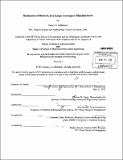| dc.contributor.advisor | Thomas W. Eagar and Roy Welsch. | en_US |
| dc.contributor.author | Lieberman, Jeremy A. (Jeremy Alan) | en_US |
| dc.contributor.other | Leaders for Global Operations Program. | en_US |
| dc.date.accessioned | 2012-09-27T15:30:52Z | |
| dc.date.available | 2012-09-27T15:30:52Z | |
| dc.date.copyright | 2012 | en_US |
| dc.date.issued | 2012 | en_US |
| dc.identifier.uri | http://hdl.handle.net/1721.1/73417 | |
| dc.description | Thesis (M.B.A.)--Massachusetts Institute of Technology, Sloan School of Management; and, (S.M.)--Massachusetts Institute of Technology, Dept. of Materials Science and Engineering; in conjunction with the Leaders for Global Operations Program at MIT, 2012. | en_US |
| dc.description | Cataloged from PDF version of thesis. | en_US |
| dc.description | Includes bibliographical references (p. 88-91). | en_US |
| dc.description.abstract | It is an axiom of the manufacturing of any complex product that errors will occur that require repair or discard of said product. In building aircraft, Raptor Aerospace encounters and repairs numerous deviations from the original design drawings. This process is known as rework. Reducing the amount of rework necessary represents a substantial opportunity both for improving quality and for cutting cost. Rework can be further split into several categories, with the simplest repairs referred to as reworkable discrepancies which has been valued at over $50,000,000 per year. This thesis will present a project that began at the start of the internship, when the author was paired with a specialist from Raptor Aerospace to lead a team whose purpose was to develop an approach and implement improvements that would generate a significant reduction in rework. This process would include both physical changes to the manufacturing process and would target specific aspects of the prevailing culture at Raptor. With no existing plan for reducing rework, the two team leaders began the project by conducting a thorough analysis of existing rework data, focusing on the descriptive texts that were provided by inspectors. This analysis generated a pareto of the inspectors' words, enabling the team to identify the most common causes of rework at Raptor. Based on these results, small teams were created to perform root cause and corrective action analyses on the biggest issues. In addition to the small teams, the co-leaders also searched for solutions that would have a systemic impact on the volume of rework. To this end, an automated tool was developed that would report the rework history of every single task completed in final assembly. Within the timeframe of the internship (6.5 months), the various approaches completed by the project team produced verified annualized savings of over $2,000,000, as well as time savings of over 40 manhours per week. In addition, other efforts that were begun but not yet completed have anticipated savings of over $10,000,000. Finally, the project has produced indications of cultural improvements within Raptor Aerospace, as individuals and departments have begun volunteering to contribute and lead improvement efforts. Overall, it appears that the approaches taken by the project team have successfully launched a change initiative which could have substantial and long-lasting value to Raptor Aerospace. | en_US |
| dc.description.statementofresponsibility | by Jeremy A. Lieberman. | en_US |
| dc.format.extent | 144 p. | en_US |
| dc.language.iso | eng | en_US |
| dc.publisher | Massachusetts Institute of Technology | en_US |
| dc.rights | M.I.T. theses are protected by
copyright. They may be viewed from this source for any purpose, but
reproduction or distribution in any format is prohibited without written
permission. See provided URL for inquiries about permission. | en_US |
| dc.rights.uri | http://dspace.mit.edu/handle/1721.1/7582 | en_US |
| dc.subject | Sloan School of Management. | en_US |
| dc.subject | Materials Science and Engineering. | en_US |
| dc.subject | Leaders for Global Operations Program. | en_US |
| dc.title | Reduction of rework at a large aerospace manufacturer | en_US |
| dc.type | Thesis | en_US |
| dc.description.degree | S.M. | en_US |
| dc.description.degree | M.B.A. | en_US |
| dc.contributor.department | Leaders for Global Operations Program at MIT | en_US |
| dc.contributor.department | Massachusetts Institute of Technology. Department of Materials Science and Engineering | |
| dc.contributor.department | Sloan School of Management | |
| dc.identifier.oclc | 810338183 | en_US |
